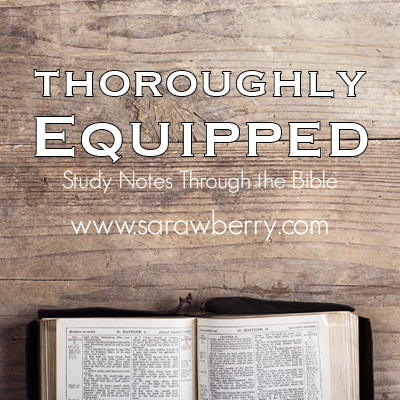Today’s reading is Exodus 13:17-15:18, Matthew 21:23-46, Psalm 26:1-12, Proverbs 6:16-19.
Today, I saw an allegory of life, which I had not thought of before. It was found in Exodus 13:17-18.
17 When Pharaoh finally let the people go, God did not lead them along the main road that runs through Philistine territory, even though that was the shortest route to the Promised Land. God said, “If the people are faced with a battle, they might change their minds and return to Egypt.” 18 So God led them in a roundabout way through the wilderness toward the Red Sea. Thus the Israelites left Egypt like an army ready for battle.
Did you know that the route through the wilderness was God’s idea? It was His plan, with His purpose. He certainly could have led them the shortest route to the Promised Land. There was a short cut, which I am sure the people would have selected, if given a vote. But God did not give them a vote. He knew that though the way through the wilderness was longer and harder, it would better prepare them for what the future held. Matthew Henry suggests that God had much preparation in store for the people, for their good and for their future victory. This is what he said in commentary of these verses.
It is said (Deut. 32:10), He led them about, some hundreds of miles about, and yet (Ps. 107:7), He led them forth by the right way. God’s way is the right way, though it seem about. If we think he leads not his people the nearest way, yet we may be sure he leads them the best way, and so it will appear when we come to our journey’s end. Judge nothing before the time. 2. There was one reason why God did not lead them the nearest way, which would have brought them after a few days’ march to the land of the Philistines (for it was that part of Canaan that lay next to Egypt), namely, because they were not as yet fit for war, much less for war with the Philistines, Exod. 13:17. Their spirits were broken with slavery; it was not easy for them to turn their hands of a sudden from the trowel to the sword. The Philistines were formidable enemies, too fierce to be encountered by raw recruits; it was more suitable that they should begin with the Amalekites, and be prepared for the wars of Canaan by experiencing the difficulties of the wilderness. Note, God proportions his people’s trials to their strength, and will not suffer them to be tempted above what they are able, 1 Cor. 10:13. That promise, if compared with the foregoing verses, will seem to refer to this event, as an instance of it. God knows our frame, and considers our weakness and faintheartedness, and by less trials will prepare us for greater. God is said to bring Israel out of Egypt as the eagle brings up her young ones (Deut. 32:11), teaching them by degrees to fly.
How does an eagle teach her young to fly? Little by little. They are encouraged to flap their wings and hop from branch to branch. They are then encouraged to catch the wind for further distances. In time, they are able to soar. But not at first. At first they can simply hop and flap. I have had many times that I have felt that I was only hopping and flapping through life. But then God showed me how to soar. How to catch the wind of the Holy Spirit and His Word. Yes, it takes effort, but the result is like none other. The view above all the daily, stressful, carnal view of life is much better indeed. My niece recently began helping lead worship at her church. I loved what she posted after the first time she had that opportunity. Along with a photo of her singing with hand raised high, she posted these words: “So thankful for a season of being stretched and grown by Jesus. I’m convinced that when you’re doing what you were created to do it feels an awful lot like flying.”
So true. But not always easy. God does not usually choose the easy path for us. But He does choose the best path for us. The path may not be a straight shot, a short cut, but its difficulty will help prepare us for all we need in preparation for an abundant future, one of His own choosing.


